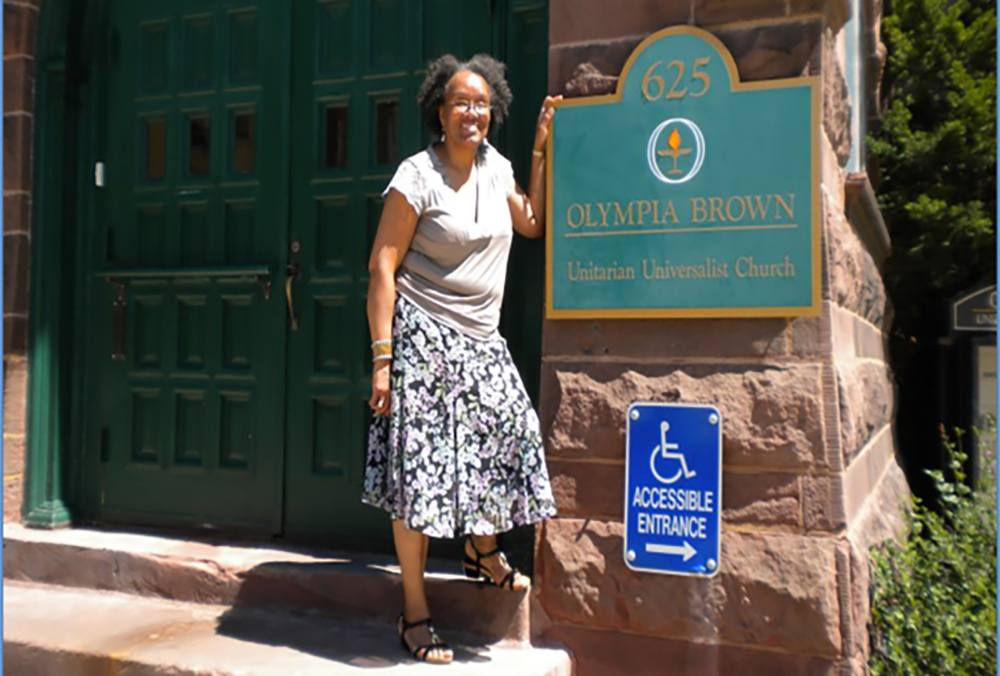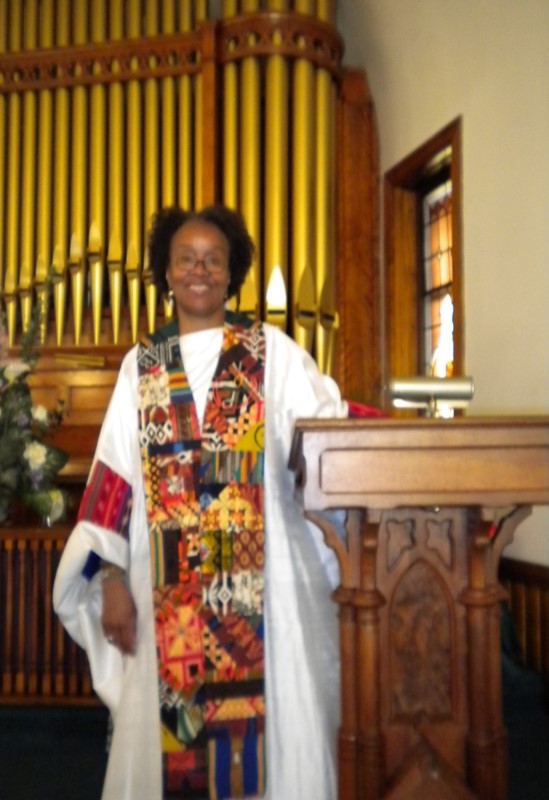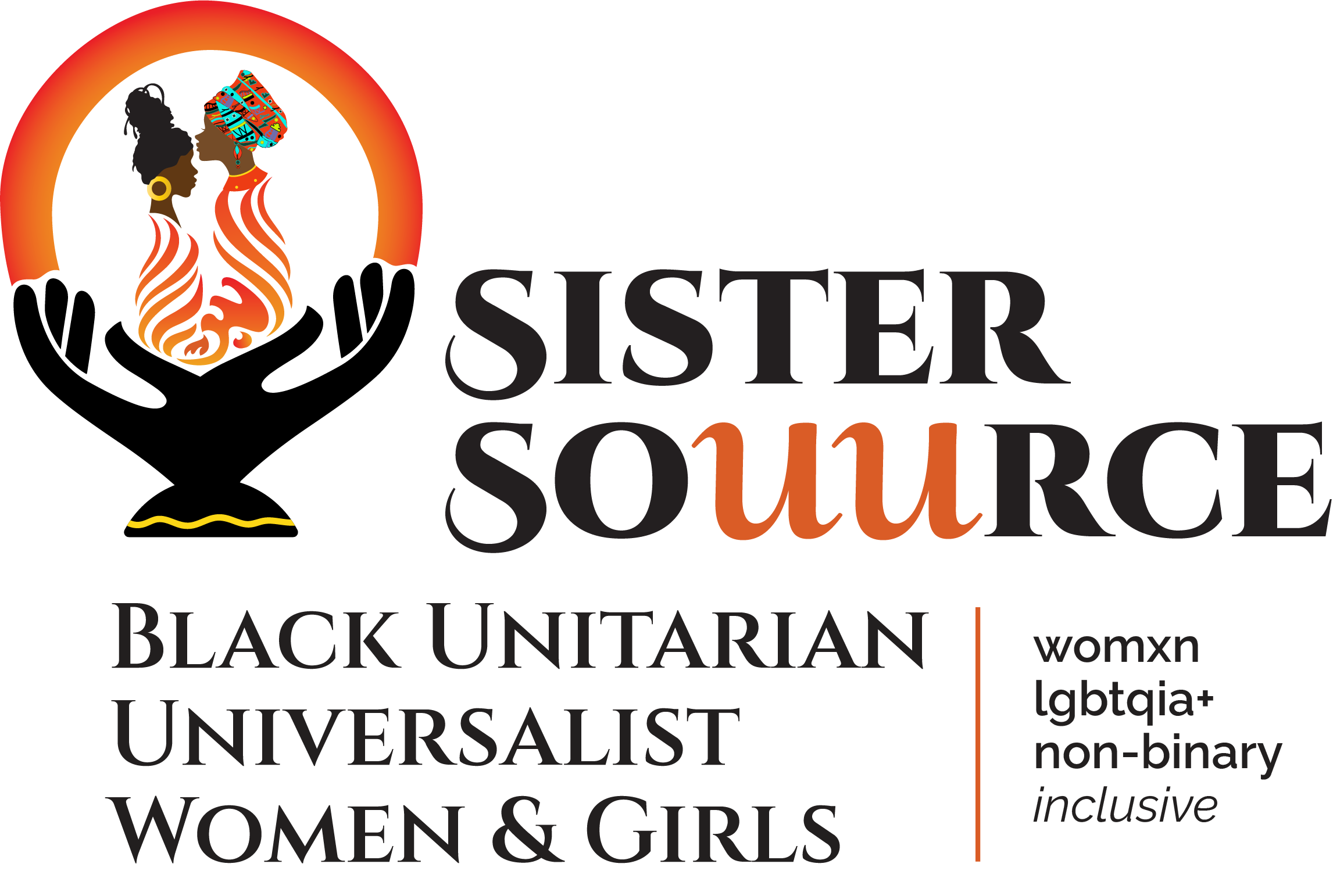
Rev. Qiyamah Rahman posing beside the plaque that identifies Olympia Brown Unitarian Universalist Church in Racine, Wisconsin, August 2010.
Getting Started: Sharing My Reflections with Seminarians of Color
By Rev. Dr. Qiyamah A. Rahman – June, 2017
The Hardest Part of Doing Anything is Starting
I recently found this poignant quote in an email sent by the Unitarian Universalist Blue Boat of Youth and Young Adult Ministries. I kept putting off seminary until shortly after 9-11 when I was reflecting on those killed and wondered had I been among the fatalities what would I have most regretted not doing before I died – not going to seminary. Very shortly after that I applied to Meadville Lombard Theological School (MLTS). It was a no brainer, they had a Modified Residency Program. I needed to work in order to be able to attend seminary. But I was finally ready!
INFORMING YOUR THEOLOGY
Your theology may or may not change over time. Just as we change our perceptions and ideas about living we change our ideas about life and living and the narratives to support those ideas. Rather than identifying one’s theology upfront you might consider identifying your values which inform your theology: Theist, Humanist, Pagan, Mystical, Christian, Buddhist, Jewish, etc. Within each of these theologies are certain traditions:
Prophetic – This tradition is characterized by Pascalian leaps of faith in the capacity of human beings’ ability to transform their circumstances, engage in relentless criticism and self-criticism and project visions, analyses and practices of social freedom. It is a given that your ministry will be prophetic. Is there any other way to do ministry?
SUPPORT
Even Our Staunchest Supporters Can Be Reactionary – Learn to be Forgiving
One of my staunchest mentors that encouraged me to check out MLTS and was supportive, later became a challenge once I was on faculty. In that role he continued to “see” and consult with students (which was in my portfolio), despite the fact that the individual had retired. When I confronted him, he said, “I can’t help it if they come to me.” I was furious!
In another instance, I was having a conversation with an individual about the Ministerial Fellowship Committee (MFC) and she was talking about some of the challenges some of our white students were having with anti-racism issues and the MFC’s subsequent reaction that resulted in these White students not being “approved” and having to return. This individual I was in conversation with, had been a UU ally over the years to many UUs of color and had participated in many diversity and anti-racism trainings locally and with the Unitarian Universalist Association (UUA) as a trainer. I shared my experiences that I had not had any problems with the MFC and he very casually said, “And of course, you as a Person of Color (POC)/Black person would not.” I was stunned. Was he implying that I had been given a pass? I do not recall if we had further conversation or if he volunteered that the MFC would be more lenient to me as a POC. I had such a mix of emotions that I did not engage him further. I was angry that he thought I needed a special pass and was in fact given one as a POC. I was also angry that it had never occurred to me that perhaps the MFC thought they were helping seminarians of color by being “easier” on us. Did they think we were less intelligent or were they trying to fast track ministers of color to be able to increase the numbers in our movement and denomination? How does that serve to promote the thinking of some White UUs that UUs of Color are not as capable and competent? I suspect you will run into some of all the above. Be your “bestest” version of yourself and let your light shine brightly. And know that is the problem of White UUs and not your problem.
Self-Awareness
Unitarian Universalism and ministry come with their own challenges. Do not add your own “stuff” to the mix. Identify and implement a lifestyle that de-stresses you, keeps you centered and hones spiritual practices that can carry you through whatever life hands you.
Continue to reflect on and deepen your theology and maturity as a spiritual being. For some people that means reading, studying, writing and discussion. For others it is social justice or a combination of all these. I emphasize this because the racism, the classism, the UU culture will continually challenge you. I never found myself questioning UUism. I questioned a particular congregation, a particular region of the country, particular personalities but seldom did I question UUism itself. I think that is because UUism is me. I don’t question ever giving up on myself. I question what I believe and I question perhaps why, etc. but I am never going to give up on myself. Some of us have made great sacrifices to be here so we have to know it is worth it. I initially came to UUism because of its social justice orientation. I have stayed all these many years because of its theological diversity. I cannot find a spiritual home where I am free to be a culmination of all my beliefs. I can give that a name or not. Where else can I go?
But you better be grounded in what and why you believe ’cuz it will cause you to question whether it is worth it. So if you think there is a better place you need to be, then go and find it. Don’t remain where you are not getting fed and where you are not growing.
Approaching New Levels of Development, Milestones and Transitions
Make sure you have sufficient support and engage spiritual practices that keep you firmly in touch with your center. Be familiar with the signs that you are losing it or getting close to the edge! In the Batterers Group I recently co-taught, I devised an exercise to help the men identify their individual signs before they actually became violent. I had them identify and name the actual symptoms and behaviors they experienced right before they became aggressive and violent. Intolerance and negative thoughts about partner, twitching, pacing, nervous energy, raised voice, confusion, brain and head swirling, impatience, hostility, anger, wanting a drink/cigarette, angry looks etc., sweaty palms were some of the feedback they shared.
What are the symptoms and behaviors you demonstrate when you are approaching your “out of control” place? Here are some of mine: short patience, snappy, cynical, unkept house, poor self-care (not appearance but eating poorly, not cooking, neglecting my health and exercise routine), isolation, questioning my worth and value, dissatisfaction with my life and accomplishments, negative thoughts, general low grade depression but not sure what it is about.
Know your signs and take measures to rectify them.
Mentoring and Support Systems
Utilize mentoring opportunities. If you go superficial you will get superficial results. This is an investment in your development and ministerial formation. Do not view it as a hoop you have to jump through for the MFC but as a support to grow you. Give some serious thought to what qualities and the type of ministry you are passionate about and that might be best for you. You will not always be able to have mentors of color. And they may not always be best for you. If you have never had a close working relationship with a white male as was my case then go against the grain, lean into the discomfort and leap into the unknown. I went with a couple of mentors. I have had difficulty maintaining mentors now that they are not required. That is my laziness and I am paying a price for it.
ACADEMIC SETTING
Classroom
Utilize every course, research paper and reading assignment to learn more about yourself and those things that can grow you as a human being and a minister. There is no way an instructor can personalize the course for you. So decide to meet the professor’s goals and set some goals for yourself. This might be the last time you have an “expert” available to you. So take full advantage of it. For example, instead of writing a paper, I asked the instructor if I could develop a semester syllabus for a course that I wanted to teach after I graduated. I had been doing excellent work and she knew I wasn’t trying to “get by.” So she gave me permission. I wrote a kick-ass curriculum titled, Violence Against Women from a Global Perspective. It was apparent that I had conducted some in-depth research and the professor ended up giving me an A on the assignment and making some suggestions for the reading list as well as ways to teach the course. Another time the final paper was a ten-page paper on any subject. I wanted to learn more about Unitarians around the world. My final paper was twenty pages. In addition, I compiled a directory of all the Unitarian, Universalist and UU global organizations and resources that I could identify. And I learned some in-depth information about our history with the Khasi Hills in India. The instructor probably hated me because I gave her way more work to read and grade. But hey, it is not about them. They have their degrees and expertise already.
My first paper on Frances Ellen Watkins Harper was written in a graduate course at Clark Atlanta University titled, Introduction to Women and Development. The class had nothing to do with the topic, but when I explained to the instructor why I wanted to write about Harper she gave me permission. That paper began my love affair with Harper that continues to this day! It also was the basis for the essay I submitted to Dorothy May Emerson for the anthology, Standing Before Us, that was published in 2000. It was also my first published work in the UU community.
Way back when in 2007 it was not uncommon for instructors’ entire syllabi to only include white authors. When venting my frustration about an instructor’s syllabus that did not include one single author of color the individual I was speaking to said, “I told that instructor the same thing ten years ago when I took their course.” Come on folks, we can do better than this! Sometimes it will be all you can do not to roll your eyes and suck your teeth in the face of some of the very obvious lack of multiculturalism. I pray it has gotten better.
Don’t be afraid to speak to issues like this and challenge the instructors if their syllabi and courses fail to be anti-racist, anti-oppressive and multicultural. However, it is so much better when our white allies do this so that we do not become a target for any reprisals or worse, a crutch for Whites with POC doing all the work all the time. Humility is important. It is so easy to get big headed with some of the older instructors that do not have a clue.
Institutional Culture and Accountability
Pay attention to what the institutional culture is in the seminary you have chosen to attend. All your best research does not fully inform you until you begin to matriculate. Being a UU and a POC will in most instances place you in the minority in almost every setting. That is not negative in and of itself unless the institutional culture is biased towards whiteness. Expect to do a lot of the work that the institution should be doing. Find some institutionalists, that is, individuals that are part of the institution that are progressive and feel a sense of pride, accountability and integrity about their institution’s commitment to students of color. That is, they genuinely care and want to know that their beloved institution is living up to its claim to be anti-racist, etc. They want to improve and want to hear your feedback!
In my early naivete I used to love pointing out the ways in which whites were not being fair and just. But now I am more mature and more forgiving. Have I adjusted my standards? Absolutely! Unlike a friend I recently spoke to who has become cynical and left Unitarian Universalism altogether, I have acquired a low grade “racial fatigue fever,” that is, I am probably more uncomfortable with racial issues now and I do less and less of that work as my patience and tolerance have waned. And I easily tire of such matters. While racial fatigue is usually associated with whites who think UUs of color spend far too much time thinking, talking and acting on issues of race, on the contrary, the reality is that our society is a race-conscious society and those that are most impacted by it tend to think, talk, act and react to it most frequently. I think in my “old age” I have acquired racial fatigue because I am feeling that given the amount of time and energy and finances we have put into it as a denomination and movement that we have only achieved baby steps. That is discouraging! I think white UUs are some of the most progressive whites in this country. If they can’t get it right I worry about the rest of America. So now it is time for me to focus on another level. Perhaps that is why I have turned to research and documenting our history and efforts. My twenty-eight years as a UU do not give me a get-out-of-talking-about-it card but it does give me a get-out-of-working-on-it-card. Instead, I want to document what we have done or not done and try to analyze that information to see if I can come up with some insights and patterns. There is a research methodology called emergent theory where the researcher gathers all their research and “stirs” it up and “mixes it about” and then observes what surfaces. That is where I feel I am. Let me see what is rising to the top that allows me to speak truth to the situation.
I have tired of fighting what sometimes seems like the same battle or simply an endless battle against racism. So as I claim my 70th decade in the wilderness of life, it is no accident that I have pulled back from anti-racism work to focus more on my legacy work, that is, research, writing and speaking about our history and the ways in which we are living out our faith and values. My current research interest is the presence of Black women in UUism and of course, our diversity efforts. I look forward to hearing POC stories about how they came to be attracted to UUism, what has kept them and the challenges they have faced and overcome.
Words of Wisdom
There are a lot of words of wisdom I could include, but I particularly like Rev. Gordon McKeenan’s (now deceased White UU male). I do not know his history around anti-racism, anti-oppression and multiculturalism, but his words reveal deep insights about ministry simply stated:
Remember who you are, Remember those you serve, Remember those who came before you and Remember you chose this! ~ Rev. Gordon McKeenan
Blessed Be! ~ Rev. Dr. Qiyamah A. Rahman

Rev. Qiyamah is the first woman of color to stand on the chancel, behind the lectern from which Rev. Olympia Brown had preached. Rev. Qiyamah preached a sermon titled, Wrapped Up, Twisted Up and Tangled Up in UUism on August 15, 2010 at the Olympia Brown Unitarian Universalist Church in Racine, Wisconsin.
Do You Have a Perspective on Ministry?
Do you have a perspective on ministry you want to be considered for publication? If so, please visit our Call and Guidelines for Submissions.
